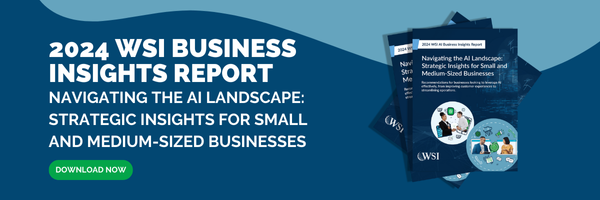In the changing world of digital transformation, Artificial Intelligence (AI) is now essential for business success. However, even as people are more aware of AI and its possibilities, many businesses still hesitate to use it.
Why AI Should Be Central to Your Business Strategy
Integrating AI is no longer an option but is necessary for businesses seeking to stay competitive in today’s fast-paced environment. AI capabilities extend beyond automating tasks; they provide critical insights through data analysis, helping organizations make informed business decisions. By leveraging AI, companies can transform traditional business models, aligning AI strategies with their overall business goals to gain a competitive advantage.
AI initiatives, when aligned with a strong data strategy, allow businesses to uncover new opportunities and drive previously unattainable business outcomes. Predictive analytics and AI’s ability to process vast amounts of data quickly help businesses identify trends, make faster decisions, and implement AI-driven strategies to meet customer expectations. AI's potential to augment human intelligence makes it essential for maintaining a leading edge in competitive markets.
Companies that fail to adopt an AI strategy lack opportunities to use AI as a core building block in strategy development. Building an AI strategy allows organizations to optimize operations, improve customer experiences, and gain business value by staying ahead of the curve. As AI evolves, businesses embracing AI capabilities will be better positioned to transform their business outcomes.
WSI's AI Business Insights Report shows that even though 72% of those asked think AI can help them reach their business goals next year, a shocking 55% said either there was no talk about AI or they only had informal chats regarding it in their business during the past 12 months. This gap is a sign that there's an urgent need for organized and planned discussions about AI. These discussions will help ensure that AI is adopted and used effectively.

The Impact of AI on Business Goals
AI can change many aspects of a business, like improving customer service and digital marketing strategies. It can also smoother supply chain management and optimize internal processes. However, this report's findings reveal that around 34% of people who answered have yet to allocate a budget for AI adoption.
Additionally, about 35% still need to add AI adoption to their business plans as an important task to focus on. Even more surprising is that nearly a quarter (24%) revealed there still needs to be an agreement on how much worth AI holds within their business setup. The numbers highlight a clear requirement for businesses to acknowledge AI's advantages and progress from understanding its potential toward actual application.
Overcoming Siloed AI Knowledge
The survey shows a problematic pattern of separated AI understanding in groups. Management (58%) and Marketing (43%) teams are the prominent supporters of AI acceptance, but other departments like Sales and Business Development (23%), IT Department (19%), Operations Team (15%), and Frontline Staff (13%) display noticeably lower acceptance rates. This division of AI knowledge could cause obstacles and slow down the usage of AI throughout the organization. Talks between different departments and making plans at a strategic level are very important. They help to break these silos down, so all team members know and can be part of AI projects.

Although some level of experimentation with AI is praiseworthy, the lack of formal training and corporate guidance might result in unwanted outcomes. Businesses need to establish AI principles and clear guidelines; through this, they can control risks and promote a culture for responsible AI experimentation. Organized conversations about how to use AI and where it can be applied are crucial for understanding how AI is being used now and finding new ways to help achieve business goals. The conversations must include representatives from each department to ensure a comprehensive method for adopting AI.
Upfront and collaborative talks can be the first push for new kinds of creations. If we include team members from different departments, businesses may find fresh viewpoints and thoughts on how AI can help them grow and become more efficient. For instance, marketing teams could consider using AI to segment customers and create personalized marketing plans. At the same time, operations teams might explore how AI could improve supply chain management or cut down on costs. Discussions involving cooperative work can generate AI applications customized to the business's particular requirements and objectives.
from different departments, businesses may find fresh viewpoints and thoughts on how AI can help them grow and become more efficient. For instance, marketing teams could consider using AI to segment customers and create personalized marketing plans. At the same time, operations teams might explore how AI could improve supply chain management or cut down on costs. Discussions involving cooperative work can generate AI applications customized to the business's particular requirements and objectives.
Integrating AI into Every Business Department
For AI to truly revolutionize a business, it must be integrated across all departments. AI is not just for marketing or IT; every department, from operations to customer service, can benefit from AI's vast capabilities. However, many business leaders face the overwhelming complexity of our world, where AI technology seems abstract or niche to specific sectors. By aligning AI initiatives with overall business strategy, businesses can break down organizational silos and foster AI adoption at every level.
For example, the sales department can use AI to improve customer segmentation and personalize outreach, while HR can use AI to analyze candidate data during the hiring process. Operations teams can use predictive analytics, natural language processing, and data science to streamline processes, reduce costs, and increase efficiency. Business models that use AI to integrate capabilities across departments see greater business value from AI initiatives, benefiting from automation and better data management.
The framework for successful AI integration involves identifying the right AI strategy for your business. Building an AI team with diverse expertise, including data scientists and business strategists, is essential to deploying AI effectively across departments. This holistic approach to AI ensures that businesses maximize value from AI while creating a culture of innovation.
The Role of WSI Consultants
WSI Consultants can also assist businesses in establishing their own AI principles and guidelines. These consultants are skilled at understanding a company's brand and business objectives and can help create AI principles tailored to match these needs. By doing this, businesses ensure their AI usage is consistent with the company's values and supports its more extensive strategies.
Moreover, WSI Consultants possess deep knowledge of digital marketing and AI, making them ideal resources for guiding companies in effectively incorporating AI into their operations. The right blend of human intellect and machine learning is critical for successfully adopting artificial intelligence within any organization. This combination allows companies to benefit from the unique capabilities offered by advanced technology systems while still relying on human reasoning skills when making crucial decisions.
While implementing artificial intelligence can be challenging, WSI Consultants can help businesses make sense of which processes should be automated or enhanced by this technology.
How WSI Consultants Can Help You Build an AI Strategy
Building an AI strategy that aligns with your business objectives requires expert guidance, and that’s where WSI Consultants comes in. With deep expertise in AI strategy development and digital marketing, WSI Consultants helps organizations deploy AI solutions tailored to their needs. WSI understands that adopting AI requires more than technology—it requires an organizational shift that aligns AI initiatives with business goals.
WSI Consultants assist businesses in identifying AI use cases and crafting a roadmap for AI transformation. By focusing on business benefits such as enhanced customer experiences, automation of key processes, and improved decision-making, WSI helps businesses see the value of AI beyond just technological advancement. They guide businesses in understanding the building blocks of AI strategy, from data analysis and predictive analytics to the practical application of AI within existing business models.
Whether your company is just starting its AI journey or looking to upskill its AI team, WSI Consultants can create an AI framework that supports business leaders in navigating the challenges most strategists face. Their ability to align AI technology with business objectives ensures that AI adoption drives real business outcomes, providing a competitive edge in today’s marketplace.
Contact WSI today for further knowledge and support linking AI with your business plan. We can work together to create a custom-made AI pathway that guarantees your business is ready for success in the era of digitalization!






